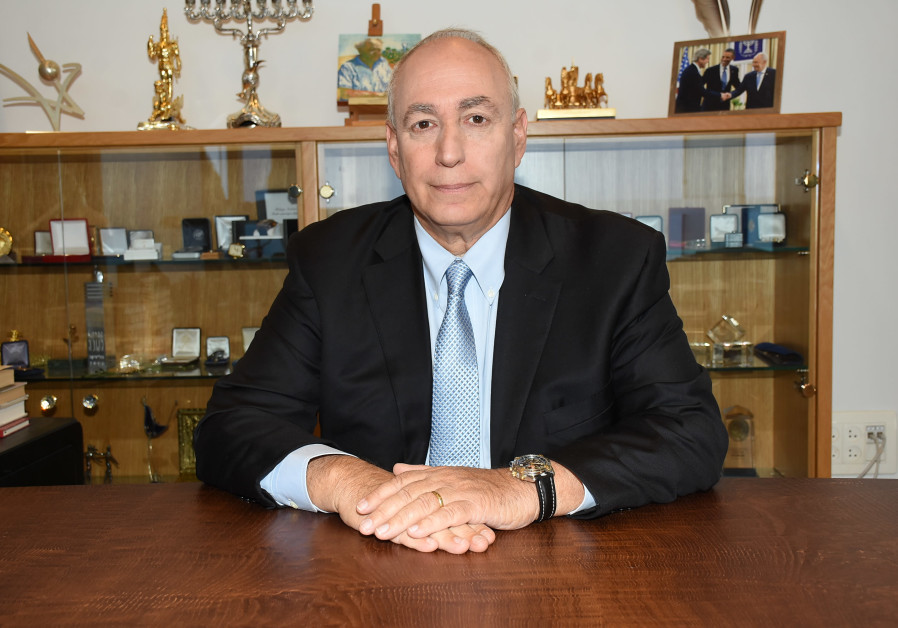Chemi Peres: Whatever happens, Jews and Arabs will live together

Peres Center for Peace and Innovation Chairman Nechemia Peres. (photo credit: AVIV HOFI)
“Whatever political arrangements” are made in the future, “Jews and Arabs will live together,” Peres Center for Peace and Innovation Chairman Nechemia Peres told a small group of journalists during a tour of the center on Tuesday.
During the briefing, Peres emphasized that the center is not political and seemed to go out of his way to distance himself from any speculation of entering politics like his father, Shimon Peres, who served as both prime minister and president.
Asked whether the center’s mission, which includes coordinating coexistence projects between Israeli-Jews, Palestinians and Israeli-Arabs, is more difficult in the current era when the Israeli Right has been more ascendant, he demurred.
He said people are too focused on the dichotomy of “right versus left” when they should be more focused on the split of going “forwards versus backwards.”
“There are issues of trust. The only question is what helps us move forward. There is a longing for peace which is not only inherited on the left side of the political map. The majority of the people in Israel, in the Arab world, among the Palestinians…at the end of the day, all of us want the same thing: to live, to be safe, for our children to be happy, and we want them to be successful,” he said.
Moving on to discussing the impact of the recent Trump administration sponsored economic peace summit in Bahrain, Peres said that, “creating a better economic situation in the region…attracting lots of investors around the world, gives people hope that they can be given a better future. But it’s not just about money or the growth rate. It’s about changing the climate and creating more trust between people.”
Pressed that the Palestinians and of others have called the summit’s ideas a non-starter, he said, “it depends how you do it…Sometimes when you offer the other side economic peace, they need to see the intent behind it and believe in the intent. They need to believe it is not going to be instead of anything else. It is a question of trust.”
He added that “bringing the day” of peace is “not necessarily just in the hands of the political system – everyone can bring the day…it may be slow and lengthy, but it may be enough to shape tomorrow.”
Asked about whether the Peres Center cooperates with Arab countries besides its projects with Palestinians and Israeli-Arabs, he said, “some more than people know…there is a lot of interest…on all parts. People understand the power of technology and innovation…People understand the role Israel plays…but in my mind less than we want.”
“It takes time….it will take a lot of time…I don’t want to get into specific examples – sometimes it means outsourcing specific technology, sometimes investments, sometimes it is surprising,” he said.
A tour guide did mention earlier two examples of the Peres Center facilitating projects with other countries or citizens of other countries, but asked to keep the names of the countries anonymous so as not to hamper the programs or endanger those participating.
Prior to meeting Peres, the journalists were given a tour of the center which has transformed itself into a much more visitor-oriented site as of October 2018, though the center has been around for decades.
If the old version of the center drew important visitors, but in small numbers, the new center is on pace to draw around a staggering 120,000-150,000 visitors a year, according to Deputy Director-General Yarden Leal-Yablonka.
The new center is outfitted to address audiences not only in English, Hebrew and Arabic, but also in Chinese, due to heavy interest from Chinese visitors and investors in Israel’s hi-tech industry.
In its news capacity, the center remains committed to building bridges toward peace between Jewish-Israelis, Arab-Israelis and Palestinians, including through technology, but it also appears to be broadening its technological focus in its own right for solving global problems.
An example of a classic Peres Center project is its recent report that it has coordinated the medical treatment in Israel of 12,588 Palestinian children and facilitated the training in Israel of 260 Palestinian doctors.
There are also a wide variety of coexistence sports, leadership training and related programs.
In terms of the newer trend, the center has an exhibit to highlight some of the latest technologies, some on the market with some on their way, which could improve the world and which might draw foreign investor interest.
One new technology from PixCell Medical Technologies helps take blood in a more flattened fashion so that artificial intelligence can be used to provide blood test results in minutes compared to today’s days or longer waiting period.
Another invention, from Eye Control, for persons who have mostly lost the ability to move their arms or speak, uses artificial intelligence to learn the relationship between a person’s eye movements and their intended speech, so it can eventually translate their eye movements through a speaker to carry on a conversation.
The center is now also outfitted with a virtual reality center activity to broaden visitors’ minds about how the future might look, an area for interacting electronically with recorded life-size projected videos of a diverse group of innovators, an interactive display of 45 new cutting-edge inventions and their companies and other modern exhibits.
Peres said, “I am a great believer in the future and that science and technology can be a source of power and social cohesion,” saying that companies with trillion-dollar valuations are technology companies and that in 2018 more people around the world became connected to the internet than not.
With people across the world facing the same changes of a society becoming more mind-oriented, he said, “Peace can be built through innovation.”
Join Jerusalem Post Premium Plus now for just $5 and upgrade your experience with an ads-free website and exclusive content. Click here>>






Comments are closed.